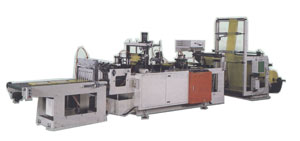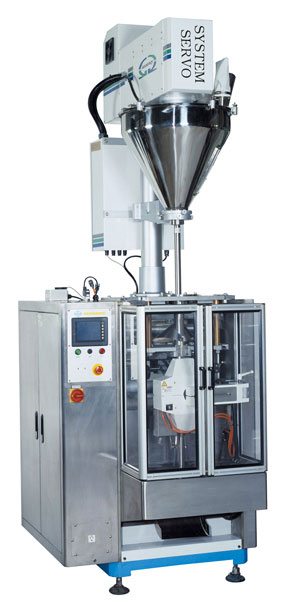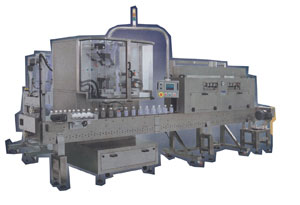Packaging Machinery Makers in Taiwan Tap Years of Experience to Cope
2009/04/30 | By Ben ShenWith over half a decade of development, Taiwan's packaging machinery industry has come a long way, during which it has built a variety of innovative products to meet global trends; while years of evolution enable Taiwan suppliers to work with foreign customers to develop customized machines that are multi-functional.
While theoretically packaging machinery makers in Taiwan believe upgrading mechanical sophistication is the way to be more competitive, but such efforts also pave an easy way for rivals from developing nations to copy and produce similar machinery at lower prices, with such underselling embroiling Taiwan makers in hardship for some years. Undeterred and unwilling to regress, Taiwan makers have been focusing on developing high-end precision machines adaptable for green packaging materials.

K.H. Lin, chairman of the China (Taipei) Packaging Association, says as the world demand for fragile packaging increases, Taiwan manufacturers of packaging machinery have to meet such need by enhancing sophistication, automation and multi-functionality. "In addition, manufacturers have to improve operating means and elevate core manufacturing skills to stay ahead in the highly-competitive world market," Lin notes.
Local Market Waning
An industry insider says the Taiwan market for packaging machinery has been on the wane, which may worsen in light that exports will continue to fall in the near term amid the global downturn, and manufacturers are keeping an eye on emerging markets in Vietnam and China. Two issues make tapping the China market difficult currently: numerous export-dependent factories in China have gone under due to the recession, hence compromising demand for packaging machinery; while mainland Chinese makers have been succeeding to beef up their own strength over the past several years.
Besides, the generally lower costs in China pare margins to paper-thin levels: For instance, a single-function sealing and packaging machine in China is quoted at less than 1,000 renminbi (RMB), which is close to its cost.

While the chilly economic winds buffet global markets, Taiwan makers of packaging machinery are still figuring out ways to innovate to survive. The following highlights a few Taiwan makers who are coping with market volatilities to find niches, perhaps not prospering but definitely showing ingenuity to achieve sustainability.
S-DAI Industrial's Sealing Machine & PC-board Cutter
S-DAI Industrial Co., Ltd., established in 1978, specializes in making machines that turn out packaging for garments, stationery, and flowers. The company focuses on manufacturing machines that are especially easy to operate, and has also branched into niche models as printed-circuit board cutters, says S-DAI general manager Jiang Jyh-long.
After setting up the firm, Jiang had focused on machines to make garment bags. Over the past decade or so, however, domestic manufacturers of such machines have moved offshore along with the island's garment manufacturers; so those that remained, Jiang says, have had to explore new markets.
The niche products first explored by S-DAI were machinery that makes floral-shaped bags and stationery-packaging. These two lines have grown steadily over the years, helping the company offset dwindling sales in the garment-packaging machine segment.

30% Price Advantage
Jiang says that his company can undercut Japanese and German suppliers by 30% on price while rivaling them in quality. He attributes this feat mostly to Taiwan's well-developed electronics industry. "Many Japanese and German stationery manufacturers and flower shop operators now prefer our machines to those supplied locally," he states.
According to Jiang, success in making machines to produce stationery and floral-shaped packaging depends on the supplier's ability to meet demands for attractiveness, precision, efficiency, and quietness. S-DAI sources all its components in Taiwan except the servomotors, which are imported from Japan.
S-DAI's monthly capacity is 25 machines, most of which are shipped to China, Southeast Asia, and India, with the maker expecting to boost shipments to Europe soon; meanwhile it is concentrating on making machinery circuitry to comply with the world-renowned CE safety standards.
Another revenue-maker for S-DAI is printed circuit-board cutting machines. According to Jiang, the company has captured 80% of this specialty market. "Our machines are very labor-saving and efficient, so only a few units are needed to achieve a huge printed-circuit-board output," he explains.
Hersonber Industrial's Servo-controlled Packaging Machinery
Hersonber Industrial Co., Ltd. has been in the packaging machinery business since 1979, accumulating almost thirty years of experience in design and manufacture of horizontal and vertical servo-controlled packaging machines, in addition to candy-wrapping machines. The company claims it has a large market share in Asia as well as Taiwan.
With specialization in design and production of various packaging equipment and systems, Hersonber says it not only can compete with world-famous brands in quality, but also is capable of offering products at the half the price of similar European models.
C.Y. Lin, president of Hersonber, notes that his company has expertise in design and manufacture to handle flexible packaging needs, providing turnkey lines, boasting also that Hersonber has a complete range of options.
Hersonber's horizontal continual-wrapping machines are designed for non-stop packaging of solid products in pillow packs, which start as rolled sheets that can be sealed hot or cold, as well as various polyethylene materials.
The machines developed by Hersonber run at medium- and high-speeds to package single product and multi-packs, adaptable for foods, baked goods and confectionery, and suitable for the chemical, pharmaceutical, spare-part, plastics, cosmetics, toys and gift industries.
Over the years, the company has developed more than 40 models of machinery, which can be divided into continual-wrapping, vertical fill, form-seal packaging machines, which can work with various automatic feed systems, and be installed with specific options to meet customers' requests.
With an in-house R&D team, Hersonber says it can design made-to-order machines.
Exporting 85% of its output, the company has buyers in 42 nations, who are served by its personnel fluent in Chinese and English.
Benison & Co., Ltd.'s Shrink Film and Machines
Benison & Co., Ltd., founded in 1962, is one of Taiwan's leading manufactures of shrink film and related machines. The company boasts it has been over the past five years Taiwan's largest supplier of PVC/PP/PE (polyvinyl chloride/polypropylene/polyethylene) heat-shrinkable films and machines to make such films, generating at least half of Taiwan's overall output, according to company general manager Benker Liao.
The maker mainly turns out machinery designed to roll out films ranging from 6mm to 1,000mm in width to wrap and package food, medication, electronic equipment, hardware, toys etc.
Going Global
To gear up to go global, the ISO-9001 certified manufacturer plans to work with suppliers at home and abroad: "In Taiwan, we plan to team up with manufacturers of high-quality machines by contracting them to supply specialty models; while overseas we plan to be a contract supplier for international heavyweights," Liao explains.
To evade underselling competition from newcomers in existing markets, the company is diversifying into new territory: Benison admits to targeting several potential markets outside Taiwan and China, but declines to specify which markets for fear that domestic rivals may copy.
Cultivating international trade specialists is also a major strategy for the company's ambitious plan. Its international marketing strategy prohibits the company from promoting the "Benison" brand in markets where it is an OEM/ODM (original equipment/design manufacturer). However, it will focus branded sales in Taiwan and emerging economies like China and Southeast Asia.
Benison is a contract supplier to several Japanese companies and is negotiating with some big players about OEM deals.




